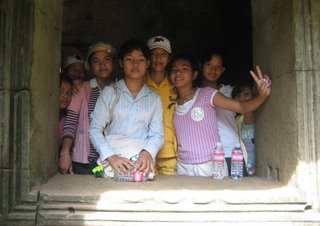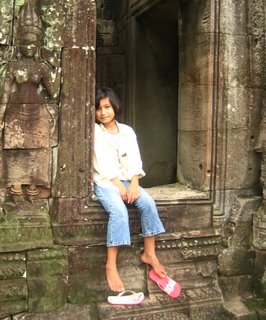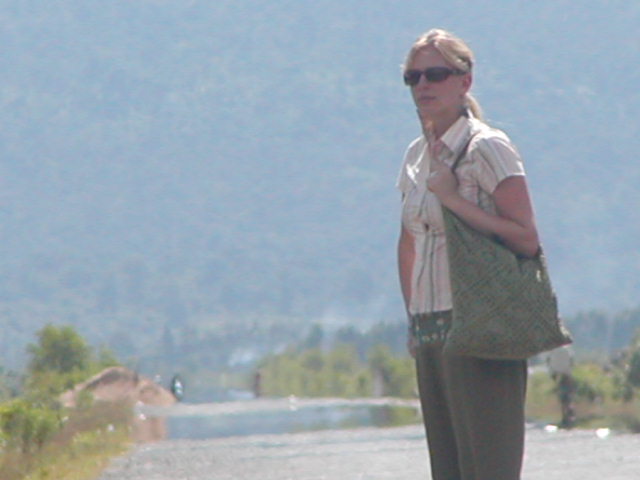
After franticly sending out emails to friends and family, and in turn their friends and family; I received almost double the amount of donations needed to take the children at my shelter on a three day trip to see the great temples of Angkor. People’s generosity and genuine interest in the lives of a bunch of kids from a far away land stunned me. O.K, so they are not just a “bunch of kids”, I had already told of their courage, their laughter and their tragic stories, and you knew how much they needed a holiday.
People keep asking me “how much did you raise?” Well, as it stands, around $1200 (US), and we only needed $700, and donations are still coming. Exciting plans are already underway for the remainder of the donations and any future funds, including a karaoke party at an orphanage for children with AIDS, and a big jewellery project, details on those to come soon!
While we are on the subject of donations, I must have a small rant…
Due to it's turbulent history, Cambodia is almost entirely economically bolstered by foreign aid and has no real significant industry to call it's own. The number one industry is garment factories, which create a lot of (badly paid) jobs, but are almost all owned by Korean, Japanese and Chinese companies. Tourism is the next booming industry however the extent to which this is exploited by foreign companies is phenomenal. In Siem Reap, which receives over 1mill tourist a year all heading to the temples of Angkor, almost all Korean tourists will go through Korean tour operators, stay in Korean owned hotels, eat in Korean owned restaurants and shop in Korean owned souvenir shops. This is the same for many Japanese, Taiwanese and Chinese guests. They have got a mafia style operation running to cater for tourists who want to see one of the wonders of the world but in the comfort of their world and consequently fail to invest $1 in Cambodia’s economy.
So because Cambodia cannot economically sustain itself; massive first world Non-Government Organisations (NGO’s) and Government Organisations (GO’s) feed Cambodia’s economy.
 However, they are also riddled with corruption, but a form of corruption deemed entirely acceptable by the international community. Let me illustrate with an example:
However, they are also riddled with corruption, but a form of corruption deemed entirely acceptable by the international community. Let me illustrate with an example:Last week I went to a fascinating meeting held by Save the Children for the launch of a multi-million dollar project to improve Cambodia’s education system. As I sat with around 300 other NGO workers in one of Phnom Penh’s top hotels enjoying a fabulous free buffet dinner (courtesy of STC), 15 KM down the road there were children starving to death in orphanages in the slums that don’t even have enough funds to buy rice. So let me just tell you this: for every dollar, pound, yen, or whatever you donate to Oxfam, Save the Children, UNICEF, Red Cross, Cancer Research etc. the majority goes on “overheads” and “expenses”, i.e. dinners in 5 star hotels, shiny American 4x4 land cruisers and enormous wage packets. I can guarantee that every $1 you donate to me goes directly to the people.
Just one question then:
‘How the f#@k do I cancel the 2 pounds standing order that floats out of my bank account and into Oxfam’s marketing campaign every month?’
Yes, that could provide schooling for a child for a whole year…if I bi-passed the whole organisation and gave it directly to the child!
Now on to the real reason why we are here: Siem Reap.
I jumped on the bus in Phnom Penh to be greeted by 16 eager faces:
“Goood moooorning Antonia, How are youuuu?”
They were unbelievably excited and as soon as the bus started moving the singing broke out, a bea
 utiful Khmer song about Siem Reap and the temples of Angkor. I don’t think any of the children slept the entire 5 hour journey, they were just too excited. We arrived at the guesthouse and god help me, each room had a T.V so on went the Karaoke channels, but at east I got to hear more of the children’s beautiful voices. All the children received disposable camera’s since they love photos of themselves, which they went crazy over. Trying to get them to save pictures for the following day at the temples was a serious challenge, but it was so sweet to see the different ways they treated this gift. One of the two boys was so meticulous; he lined up the shots carefully and used the film sparingly, while most of the teenage girls snapped away like crazy, posing in every possible way in front of any background.
utiful Khmer song about Siem Reap and the temples of Angkor. I don’t think any of the children slept the entire 5 hour journey, they were just too excited. We arrived at the guesthouse and god help me, each room had a T.V so on went the Karaoke channels, but at east I got to hear more of the children’s beautiful voices. All the children received disposable camera’s since they love photos of themselves, which they went crazy over. Trying to get them to save pictures for the following day at the temples was a serious challenge, but it was so sweet to see the different ways they treated this gift. One of the two boys was so meticulous; he lined up the shots carefully and used the film sparingly, while most of the teenage girls snapped away like crazy, posing in every possible way in front of any background.September 19th
It’s 5am, my birthday and everyone is up, showering, karaoke T.V on, grooming, laughing, chatting, I groan and manage to lounge in bed until 6.30. By the time I had got out the shower, everything is in silence,
“Where is everybody?”
I drag myself down the stairs to find them all on the bus, patiently waiting for me, and then the singing started up again, now I’m smiling inside and out. Finally arriving at the temple ruins with 16 Cambodian kids who had only seen these images in pictures and on T.V was truly remarkable, something I will never forget. The children were an absolute
 dream, not once for the entire day did I walk without a child holding each of my hands or wrapping their arms around my waist. We climbed 30 metres up vertical stairs to the top of Angkor Wat and marvelled at the stunning views of endless temple ruins, lakes and huge old trees. We had races from temple gates to stone statues, we played hide and seek amongst the maze of tunnels, pillars and stairs of Angkor Thom. The kids practiced their Japanese on the tourists who were loving the opportunity to photograph "authentic Cambodian children", only too happy to play up to the lens. Not once did I hear anyone moan, cry, argue, bicker the whole trip, if fact come to think of it the whole time I have known them. Can you imagine the behaviour of children and teenagers who have gone through similar traumas in the UK or US?
dream, not once for the entire day did I walk without a child holding each of my hands or wrapping their arms around my waist. We climbed 30 metres up vertical stairs to the top of Angkor Wat and marvelled at the stunning views of endless temple ruins, lakes and huge old trees. We had races from temple gates to stone statues, we played hide and seek amongst the maze of tunnels, pillars and stairs of Angkor Thom. The kids practiced their Japanese on the tourists who were loving the opportunity to photograph "authentic Cambodian children", only too happy to play up to the lens. Not once did I hear anyone moan, cry, argue, bicker the whole trip, if fact come to think of it the whole time I have known them. Can you imagine the behaviour of children and teenagers who have gone through similar traumas in the UK or US?We had a picnic lunch in a deserted, peaceful spot next to the huge moat that surrounds Angkor Wat. Using our fingers, we hungrily tucked into a feast of rice, fried fish, chicken and eel, in the true Cambodian way: making as much noise and mess as possible. Bones were sucked, crunched and spat, and fish heads were excavated, no part of the animal ever goes to waste in Cambodia (a facet of their culture I can never bring myself to embrace, once again I blame it on the vegetarian upbringing!). After the meal was finished, the kids collected up all the plastic trays, cups, tissues and plastic bags and just as I’m admiring the beautifully clean surroundings; they attempt to throw the whole lot in the bush.
“No, no, no!” I shout
“This is Angkor Wat, look…” I’m franticly pointing at my eyes and then at the ground
“Look, beautiful, clean, no plastic”
They look a little stun
 ned, laugh nervously and put the rubbish back with the rest of our belongings. Two girls wander off, chatting, drinking cups of coke. One throws her cup into the moat (one of the only clean bodies of water I have ever seen in Cambodia), and the other throws hers on the ground. I run after them and pick the cup up from the floor and hand it back, I’m struggling to keep my patience. I ask one of the teachers to translate; I need to teach them about waste management, she laughs:
ned, laugh nervously and put the rubbish back with the rest of our belongings. Two girls wander off, chatting, drinking cups of coke. One throws her cup into the moat (one of the only clean bodies of water I have ever seen in Cambodia), and the other throws hers on the ground. I run after them and pick the cup up from the floor and hand it back, I’m struggling to keep my patience. I ask one of the teachers to translate; I need to teach them about waste management, she laughs:“I know, I know, not in Angkor Wat” she says
I’m incredulous
“No not in Cambodia! This plastic will be here long after the temple ruins have all gone. You can’t just dump rubbish all over your country”.
For me, living amongst mounds of rubbish everywhere you go, is one of the harsh realities of Cambodian life.
We are both lost.
How can I promote my first world ideals about waste management to a country that has practically no infrastructure or education to address these problems? And how can they understand the concept of deferred gratification; that their health and their environment will be protected in the future if they change their behaviour now. It’s in these situations that I really have to step back, close my eyes and try to imagine life from their perspective. Of course I cannot comprehend their lives, but I quickly realise I cannot be angry with kids who are simply mimicking behaviour taught to them by the rest of their society. There are so many massive problems to overcome in this country, what might be big to a privileged westerner could be at the very bottom of the list for the locals. All these things will come eventually through development, always step by step.
That evening we celebrated my birthday in the guesthouse with dinner, games and a huge chocolate cake. Then one of the most humbling things of my life happened to me. The kids had used pa
 rt of the $1 spending money that Turbo had donated to each child, and spent it on gifts for my birthday. I was absolutely dripping in necklaces, earrings, rings and bracelets. Inside I was crying, while outside I was smiling and just drinking up their warmth and love. As much as life in Cambodia can be challenging, frustrating and sometimes depressing, nothing I have ever done has been as rewarding as receiving those gifts and hearing them chime:
rt of the $1 spending money that Turbo had donated to each child, and spent it on gifts for my birthday. I was absolutely dripping in necklaces, earrings, rings and bracelets. Inside I was crying, while outside I was smiling and just drinking up their warmth and love. As much as life in Cambodia can be challenging, frustrating and sometimes depressing, nothing I have ever done has been as rewarding as receiving those gifts and hearing them chime:“We love youuuu, we are happy”.
These children are my Cambodia.
To everyone who donated and made this trip happen, I whole heartedly thank you, I will never forget, and I’m sure the children will never forget the day they got to see the most important legacy of their people.
